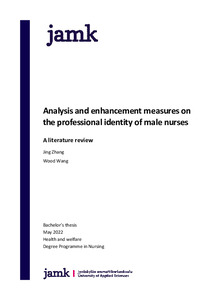Analysis and enhancement measures on the professional identity of male nurses
Wang, Wood; Zhang, Jing (2022)
Wang, Wood
Zhang, Jing
2022
Julkaisun pysyvä osoite on
https://urn.fi/URN:NBN:fi:amk-2022051810042
https://urn.fi/URN:NBN:fi:amk-2022051810042
Tiivistelmä
Background: Nurses are the largest and vital component of the healthcare industry. The nursing brain drain, as well as the instability of the nursing workforce, is exacerbated by several factors, including a lack of potential educators, high turnover and an inequitable distribution of the workforce, along with the ageing of the society's population. The shortage of male nurses, in particular, has been given high priority.
Aim and purpose: The aim was to analyse the current situation of the professional identity of male nurses and to propose relevant measures to increase male participation in nursing. The purpose was to reduce gender-based stereotypes and to increase the professional identity and motivation of male nurses.
Implementation method: The authors conducted a literature review and retrieved a large amount of data from PubMed and CINAHL databases. Twelve articles (seven selected by each author, with two duplicates) were reviewed and analysed using inductive content analysis.
Results: The factors influencing the professional identity of male nurses were analysed in terms of existing stereotypes, the stress of nursing, and the pressure to feel the role. At the same time, measures to strengthen the professional identity of male nurses were proposed in terms of social guidance and policy, clinical practice and education, and education in schools. The results of the analysis indicate that the external world should give high priority to positive measures to enhance the professional interest of male nurses.
Conclusion: Effective interventions should be taken to tap into the rich connotations of male nurses' professional interests and guide male nursing staff to change their perceptions rationally that objectively and practically sort out and feel their professional concerns so that they can positively perceive and evaluate their careers. They can enhance their sense of professional interest, strengthen their professional identity, engage in their work with gratitude and give back to their professional interest.
Aim and purpose: The aim was to analyse the current situation of the professional identity of male nurses and to propose relevant measures to increase male participation in nursing. The purpose was to reduce gender-based stereotypes and to increase the professional identity and motivation of male nurses.
Implementation method: The authors conducted a literature review and retrieved a large amount of data from PubMed and CINAHL databases. Twelve articles (seven selected by each author, with two duplicates) were reviewed and analysed using inductive content analysis.
Results: The factors influencing the professional identity of male nurses were analysed in terms of existing stereotypes, the stress of nursing, and the pressure to feel the role. At the same time, measures to strengthen the professional identity of male nurses were proposed in terms of social guidance and policy, clinical practice and education, and education in schools. The results of the analysis indicate that the external world should give high priority to positive measures to enhance the professional interest of male nurses.
Conclusion: Effective interventions should be taken to tap into the rich connotations of male nurses' professional interests and guide male nursing staff to change their perceptions rationally that objectively and practically sort out and feel their professional concerns so that they can positively perceive and evaluate their careers. They can enhance their sense of professional interest, strengthen their professional identity, engage in their work with gratitude and give back to their professional interest.
